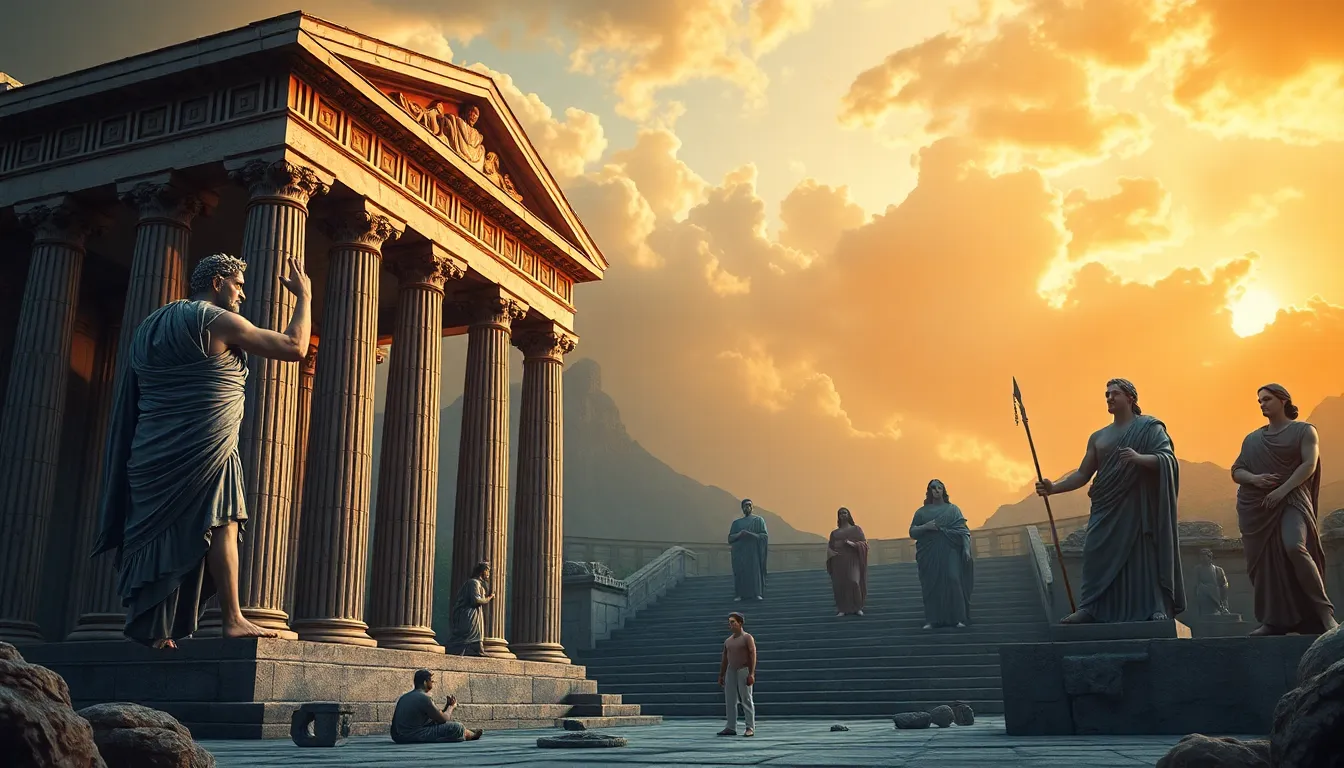The Greek Pantheon: A Study of Divine Relationships and Rivalries
I. Introduction to the Greek Pantheon
Greek mythology is a rich tapestry of stories, characters, and moral lessons that have shaped Western culture and thought. At the heart of this mythology lies the Greek pantheon, a complex hierarchy of gods and goddesses who embody various aspects of life, nature, and human experience. These deities not only governed the natural world but also served as reflections of human traits and societal values.
The pantheon is dominated by a number of major gods and goddesses, each with their own distinct personalities, domains, and stories. Among the most notable are:
- Zeus – King of the gods and ruler of Mount Olympus
- Hera – Queen of the gods and goddess of marriage
- Poseidon – God of the sea
- Athena – Goddess of wisdom and warfare
- Apollo – God of the sun, music, and prophecy
- Aphrodite – Goddess of love and beauty
II. The Hierarchical Structure of the Gods
The Greek pantheon is organized in a hierarchical structure, with Zeus at its apex. As the chief deity, Zeus wields significant power and authority over both gods and mortals, often intervening in their affairs.
Zeus’s role extends beyond mere leadership; he is also a symbol of justice and order. His decisions can have profound consequences, affecting the relationships and dynamics among the other gods. The hierarchy includes:
- The Twelve Olympians – The principal gods who reside on Mount Olympus
- Primordial Deities – The first entities that came into existence, such as Chaos and Gaia
- Titans – Predecessors of the Olympian gods, including Cronus and Rhea
III. Family Ties: The Relationships Among the Gods
The relationships among the gods are often defined by familial ties, including sibling rivalries, marriages, and parent-child dynamics. These connections are crucial for understanding their interactions and conflicts.
One prominent example is the relationship between Zeus and Hera. Married siblings, their union is marked by both love and strife. Hera is often portrayed as jealous of Zeus’s numerous affairs, leading to tension within their marriage.
Another significant relationship is that of Cronus and Rhea. As Titans, they were the parents of the first generation of Olympian gods. Cronus, fearful of being overthrown by his children, swallowed each of them at birth, until Rhea saved Zeus, leading to a rebellion against Cronus.
IV. Friendships and Alliances Among the Gods
While rivalries often take center stage in Greek mythology, friendships and alliances among the gods significantly shape the pantheon’s dynamics.
For example, the relationship between Athena and Poseidon is marked by both competition and respect. Although they competed for the patronage of Athens, their mutual recognition of each other’s strengths reflects a complex friendship.
Another notable alliance is between Hermes and Apollo. Hermes, known for his cunning and speed, was often seen as a messenger for the gods, while Apollo represented light and truth. Their friendship symbolizes the balance between wit and wisdom.
V. Rivalries and Conflicts: The Dark Side of Divinity
Rivalries among the gods often lead to significant mythological events that resonate through Greek culture. One of the most infamous conflicts is the Trojan War, a result of divine disagreements, particularly between Hera, Athena, and Aphrodite.
Key rivalries include:
- Hera and Zeus – Hera’s jealousy over Zeus’s infidelities often leads to conflict.
- Ares and Athena – As opposing forces in warfare, Ares represents chaos while Athena embodies strategy.
These conflicts not only highlight the gods’ personalities but also reflect the chaos and struggles inherent in human society.
VI. The Influence of Human Affairs on Divine Relationships
Human actions and myths significantly impact the relationships among the gods. The gods often intervene in human affairs, leading to stories that explore the consequences of divine interactions.
For instance, in the tale of Paris and the Golden Apple, the judgment of Paris leads to the Trojan War, showcasing how a mortal’s decision can ignite divine rivalries.
Additionally, divine intervention in human matters often results in repercussions for both gods and mortals, illustrating the interconnectedness of their fates.
VII. Cultural Reflection: The Significance of Divine Relationships
The relationships among the gods reflect Greek social and moral values, serving as allegories for human behavior and societal norms. The dynamics of these relationships often mirror the complexities of human interactions, including themes of loyalty, betrayal, and the pursuit of power.
These divine relationships influenced ancient Greek culture profoundly, shaping literature, art, and philosophy. Myths served as cautionary tales, lessons on morality, and reflections on the human condition, all grounded in the interactions of the gods.
VIII. Conclusion: The Enduring Legacy of the Greek Pantheon
The Greek pantheon is a complex web of divine relationships and rivalries that enrich the mythology and provide insights into human nature. The intricate dynamics among the gods reveal much about ancient Greek society, its values, and its understanding of the world.
Today, the legacy of Greek mythology endures in modern culture, inspiring countless works of literature, art, and film. The stories of the gods continue to resonate, reminding us of the timeless themes of love, conflict, and the search for meaning in the human experience.




